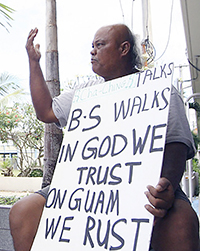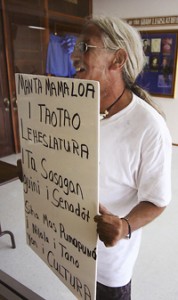May 10, 2009
American Album
Drafted at 19, Opposing Military Recruiters at 61
By TAMAR LEWIN
MIAMI – Every morning before school starts, Miles Woolley, a drafting teacher at Southwest Miami High School, gets a reminder of military life when the Junior R.O.T.C. honor guard marches by his classroom.
“Their marching and parading around in uniforms stirs bad memories in me,” he said.
Mr. Woolley, 61, is a Vietnam veteran whose service left him with a bullet in his head, a mostly useless left hand and a dragging left foot. He was drafted at age 19, not much older than his students are now, and transformed from a small-town newlywed into a fast-shooting reconnaissance soldier.
The prospect that his students might follow that path haunts him.
Southwest Miami High is a sprawling but orderly place that offers a wide range of classes, including cosmetology, auto shop and Advanced Placement calculus, to 2,800 students, most of whom are Hispanic and from low-income families.
Like many such high schools, it is also a focus for military recruiting. Hundreds of students take the Armed Services Vocational Aptitude Battery, or Asvab, test each year. More than 100 are enrolled in the Army J.R.O.T.C., drilling, marching and using dummy guns. And every Tuesday and Wednesday, recruiters from the Army, Navy and Marines set up tables in the lobby outside the cafeteria, handing out water bottles, key chains and stickers and talking up the benefits of a military career.
“There’s a lot of student interest,” said Sgt. Juan Montoya, an Army recruiter who visits the school and calls students’ homes. “The big obstacle is the parents, who think we’re going to send their kids off into combat.”
Mr. Woolley avoids the lobby.
“I don’t go there if I can help it,” Mr. Woolley said. “I don’t want to see it.”
In his three decades of teaching in Miami, Mr. Woolley’s way of handling his wartime memories has evolved.
At first, he said, he rarely talked about the war. “When I got back from Vietnam, I couldn’t imagine myself being civilized ever again,” he said.
In the 1980s, when Americans were held hostage in Iran, he was hospitalized with post-traumatic stress disorder. “The hostages, the yellow ribbons, that all hit me hard,” he said.
In the 1990s, he wrote about his Vietnam experiences, sending copies of his memoir to family and friends. “It was cathartic,” he said.
Mr. Woolley later became an outspoken opponent of the Iraq war, posting thoughts on a libertarian Web site, LewRockwell .com, and, closer to home, trying to get the military out of his school.
“I love my school and my students, and in a way they’ve become my children, so the intensity of recruitment struck me as wrong,” Mr. Woolley said. “I recognize the need for a national defense, but high school students are too young and unformed to really question what they’re being told, and it feels to me like exploitation.”
In his classroom, where students independently worked on their long-term drafting assignment, Mr. Woolley, a tall man with a white beard and a warm manner, was a gentle presence, patiently offering guidance when a student ran into trouble adjusting a tracking machine or centering a line.
Mr. Woolley does not discuss the military, unless students ask.
“I can’t tell them what to do,” he said. “I can tell them what happened to me. And answer questions. Honestly.”
Even that has been a struggle for him.
“Sometimes students ask about what happened to me, and I tell them as much as I think they can stand to hear,” he said. “Some come talk to me after they’ve already been recruited and signed their papers. I don’t want them to think that this is a mass murderer who’s been in the classroom with them. But I do want them to know that we weren’t peacemakers, we weren’t freeing anybody. Those bombs and guns do one thing. They kill.”
Mr. Woolley did his share of killing, he said, as part of a Long Range Reconnaissance Patrol unit that went into enemy territory to gather intelligence. He has vivid memories of a firefight in which he and his unit shot not only enemy soldiers, but three women, two children and a boy about 6 months old – the same age as his own son back home.
Mr. Woolley estimates that he was shot at about 100 times without being hit. But on Aug. 13, 1969, he was ambushed on a nighttime operation, took a bullet in the head and was airlifted out, paralyzed on the left side of his body. In months of rehabilitation, he regained the ability to walk and some use of his left hand. After trying the construction business and earning a degree in civil engineering, Mr. Woolley moved to Florida and began teaching. His marriage broke up after his third child was born. Remarried now, he and his wife are raising two of their seven grandchildren.
Under the No Child Left Behind Act, passed two years before the war in Iraq began, military recruiters are given access to high school students on the same basis as college recruiters. In many parts of the country, with varying success, opponents of the war organized a counter-recruitment movement to try to limit both recruiters’ access to students and the use of the Asvab. The test is widespread in Texas and Florida, like J.R.O.T.C.
When the Iraq war started, Mr. Woolley began researching the law on how the school was required to help the military, and discovered that schools have a good deal of wiggle room. He worked with a journalism student at his school on a lengthy analysis of those requirements – only to be bitterly disappointed when the article in the school newspaper last spring was cut short.
Mr. Woolley talked with the principal, James Haj, about how Southwest could, lawfully, limit the military presence. He told the principal that, for example, recruiters could be kept to rare visits and confined to an out-of-the-way room. And if the school wanted to keep offering the Asvab for career counseling, it could block recruiters from accessing the results, a change Southwest adopted last year.
The young principal and the older veteran express great mutual respect, but where Mr. Woolley wants the military presence erased, Mr. Haj is striving for a middle ground.
“It’s a delicate issue,” Mr. Haj said. “I think all voices should be heard.”
So he lets recruiters come every week but keeps them in the lobby. “Some schools let recruiters wander the halls, but I want to be able to keep my eyes on them,” Mr. Haj said. “I know Mr. Woolley doesn’t like J.R.O.T.C., but I’ve never had a single parent complaint.”
Mr. Woolley, who grew up in a small town near Buffalo, said he was content with his life and happy to be a good husband and grandfather, but was still troubled by his military actions.
“I did a very good job for the military, but it’s torn me up for my whole life,” he said. “I was a good guy when I was drafted, a good guy from a good family. I wonder a lot, how did that good guy turn into something else?”
With J.R.O.T.C. and the drafting classroom both housed in the same wing of the school, Mr. Woolley often sees the cadets in their uniforms.
“I am repulsed by what the uniforms represent,” he said. “At the same time, if a kid walks past me with his or her shirt not tucked in, or the belt not properly buckled, I stop them and tell them, ‘If you want to play this game, you have to play it by the rules. In the military, the uniform isn’t worn like this, and you know it.’ I want them to know it is not a joke.”
Source: http://www.nytimes.com/2009/05/10/education/10veteran.html?_r=1&ref=education&pagewanted=print




